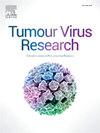De-regulation of aurora kinases by oncogenic HPV; implications in cancer development and treatment
IF 8.1
Q1 VIROLOGY
引用次数: 0
Abstract
Human papillomaviruses (HPVs) cause diseases ranging from benign warts to invasive cancers. HPVs are the cause of almost all cervical cancers and a sub-set of other epithelial malignancies including head and neck cancers, specifically within the oropharynx. The oncogenic properties of HPV are largely mediated through the viral oncoproteins E6 and E7, which disrupt many cellular pathways to drive uncontrolled cell proliferation. One family of proteins targeted by HPV is the Aurora kinase family. Aurora kinases are serine/threonine kinases including Aurora kinase A (AURKA), B (AURKB), and C (AURKC) which are often dysregulated in many cancer types, including HPV driven cancers. All three family members play essential roles in mitotic regulation and accurate cell division.
The deregulation of Aurora kinases by HPV infection highlights their potential as therapeutic targets in HPV-associated malignancies. Targeting Aurora kinase activity, in combination with current HPV therapies, may provide new avenues for treating HPV-induced cancers and reducing the burden of HPV-related diseases. Combinatorial inhibition targets distinct but overlapping functions of these kinases, thereby reducing the potential for cancer cells to develop resistance. This broad impact emphasizes the capability for Aurora kinase inhibitors not only as anti-mitotic agents but also as modulators of multiple oncogenic pathways. This review explores the combinatorial effects of Aurora kinase inhibition, offering insights into novel therapeutic strategies for the treatment of HPV-driven cancers.
致瘤性HPV对极光激酶的去调控作用对癌症发展和治疗的影响。
人乳头瘤病毒(hpv)引起从良性疣到侵袭性癌症的各种疾病。人乳头状瘤病毒是几乎所有宫颈癌和包括头颈癌在内的其他上皮恶性肿瘤的亚群的原因,特别是在口咽部。HPV的致癌特性主要是通过病毒癌蛋白E6和E7介导的,它们破坏了许多细胞通路,从而驱动不受控制的细胞增殖。HPV靶向的一个蛋白家族是极光激酶家族。极光激酶是丝氨酸/苏氨酸激酶,包括极光激酶A (AURKA)、B (AURKB)和C (AURKC),它们在许多癌症类型中经常失调,包括HPV驱动的癌症。这三个家族成员在有丝分裂调控和精确的细胞分裂中发挥重要作用。人乳头瘤病毒感染对极光激酶的抑制作用突出了它们作为人乳头瘤病毒相关恶性肿瘤治疗靶点的潜力。靶向极光激酶活性,结合目前的HPV治疗,可能为治疗HPV诱导的癌症和减轻HPV相关疾病的负担提供新的途径。组合抑制针对这些激酶的不同但重叠的功能,从而减少癌细胞产生耐药性的可能性。这种广泛的影响强调了极光激酶抑制剂的能力,不仅作为抗有丝分裂剂,而且作为多种致癌途径的调节剂。这篇综述探讨了极光激酶抑制的组合效应,为hpv驱动的癌症的治疗提供了新的治疗策略。
本文章由计算机程序翻译,如有差异,请以英文原文为准。
求助全文
约1分钟内获得全文
求助全文
来源期刊

Tumour Virus Research
Medicine-Infectious Diseases
CiteScore
6.50
自引率
2.30%
发文量
16
审稿时长
56 days
 求助内容:
求助内容: 应助结果提醒方式:
应助结果提醒方式:


